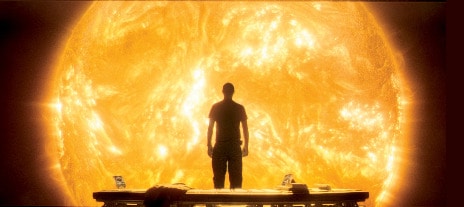“Ashes to ashes, stardust to stardust.”
Film after film, Danny Boyle defies easy pigeonholing. Even the initial salvo of his career, the so-called Bag of Money trilogy, isn’t that homogenous, and neither are his series of collaborations with Alex Garland, author of the novel on which The Beach is based and screenwriter of 28 Days Later and this here “Sunshine”. Some themes return and his way with visuals and music is rather distinctive, but his latest is as much of a departure as the “Solaris” remake was for Soderbergh.
Even within “Sunshine”, Boyle hops between genres. Well, subgenres: it’s all science-fiction, but it goes from the kind of contemplative science-fiction that Kubrick dabbled with in “2001: A Space Odyssey” to more action-driven sci-fi as perfected by James Cameron. Come to think of it, the latter also mixed “2001”-style metaphysics with thriller elements in “The Abyss”, but not quite to the extent that Boyle does here. Especially since I’ve yet to mention that, for better or worse, “Sunshine” encompasses a third subgenre, sci-fi horror.
The film, set 50 years into the future, begins as a spacecraft that left Earth 16 months prior makes its final approach towards the sun. It turns out that the star on which we rely for survival is dying down on us, so mankind has devised a plan to send a crew to deliver a nuclear device into the sun and hopefully reignite it. Not a walk in the park and, on top of the countless things that could go wrong with the technology and the unpredictable nature of the sun itself, the crew of the Icarus II (ominously named for the Greek mythology figure who perished after flying too close to the sun) will have to deal with much psychological duress and interpersonal tensions.
How do you deal with the pressure of having the fate of mankind rest on your shoulders? To err is human, but what if you make an error that results in the death of others? And how do you face your own imminent mortality? Most thought-provoking is how the characters have to make decisions while weighing between their individual feelings and the greater good. A lot is made in the film of the probabilities of success and failure of this or that action but, of course, mathematical logic isn’t always compatible with human logic. Then again, a willingness for personal sacrifice is not unheard of, as extraordinary circumstances tend to inspire extraordinary feats.

Heady stuff (and I haven’t even mentioned the vast symbolic potential of the sun that is exploited in Garland’s screenplay), but as inferred above, “Sunshine” is also full of intense and spectacular sequences. There is classic men-on-a-ship (doesn’t really matter if it’s a boat, a submarine or a spaceship) stuff like things breaking down and having to be repaired, some crazy space stunts (you’ll see) and then… Here’s where an otherwise great film loses its footing a bit. Early on, there’s an amusing “Alien” joke, the subtext of which being that relative realism is what’s on the agenda here, not fantastic threats. No extraterrestrial monster turns up, mind, but Boyle’s picture does bizarrely turn into a slasher flick during the third act
Still, “Sunshine” remains visually brilliant (pun intended), entrancingly scored by John Murphy and Underworld, and carried by a great multiethnic cast which includes Cillian Murphy, Michelle Yeoh, Cliff Curtis, Rose Byrne and Chris Evans
